黑龙江省青冈县第四中学人教版八年级英语下册课件:Unit 2 I’ll help to clean up the city parks Section A (共21张PPT)
文档属性
| 名称 | 黑龙江省青冈县第四中学人教版八年级英语下册课件:Unit 2 I’ll help to clean up the city parks Section A (共21张PPT) | 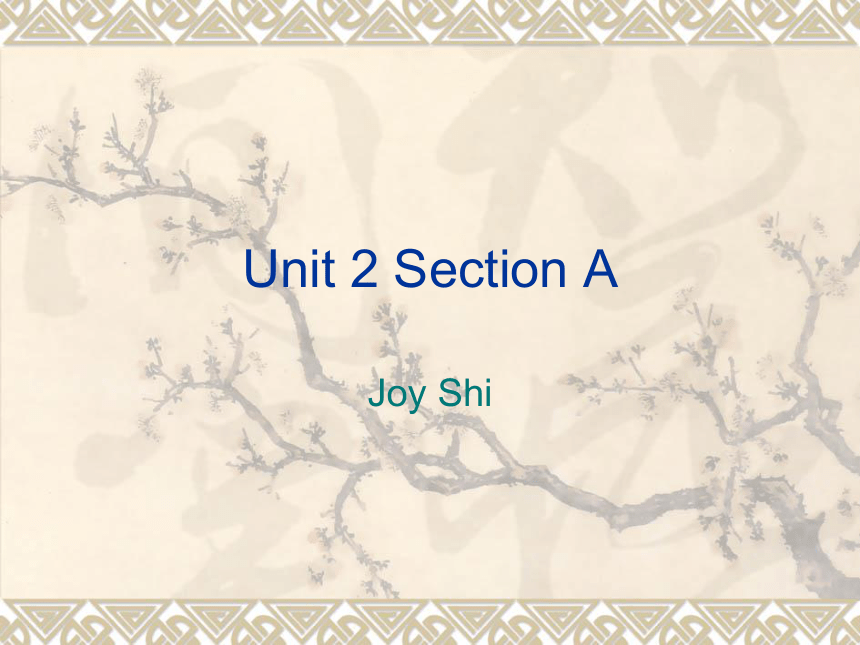 | |
| 格式 | zip | ||
| 文件大小 | 145.1KB | ||
| 资源类型 | 教案 | ||
| 版本资源 | 人教新目标(Go for it)版 | ||
| 科目 | 英语 | ||
| 更新时间 | 2016-07-07 07:59:27 | ||
图片预览

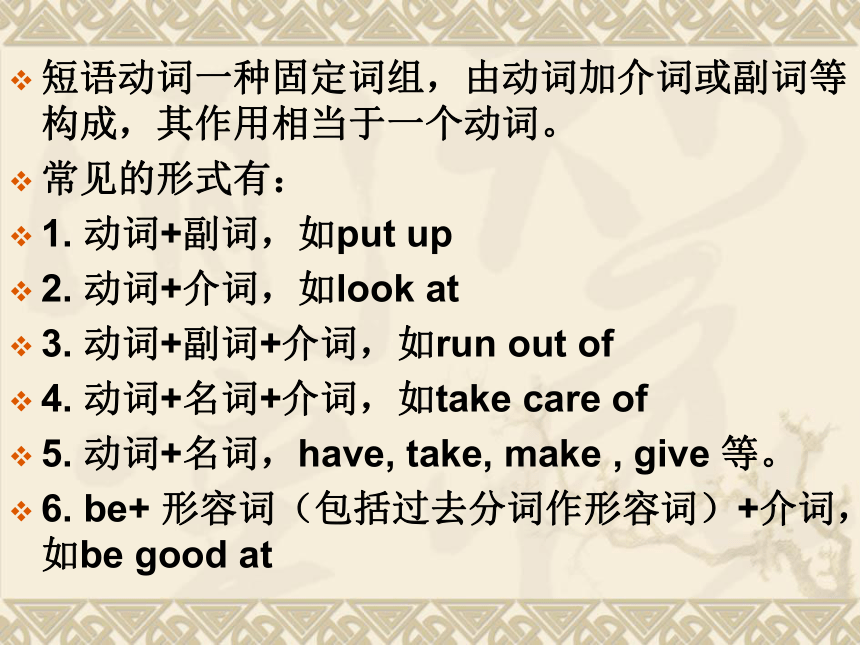
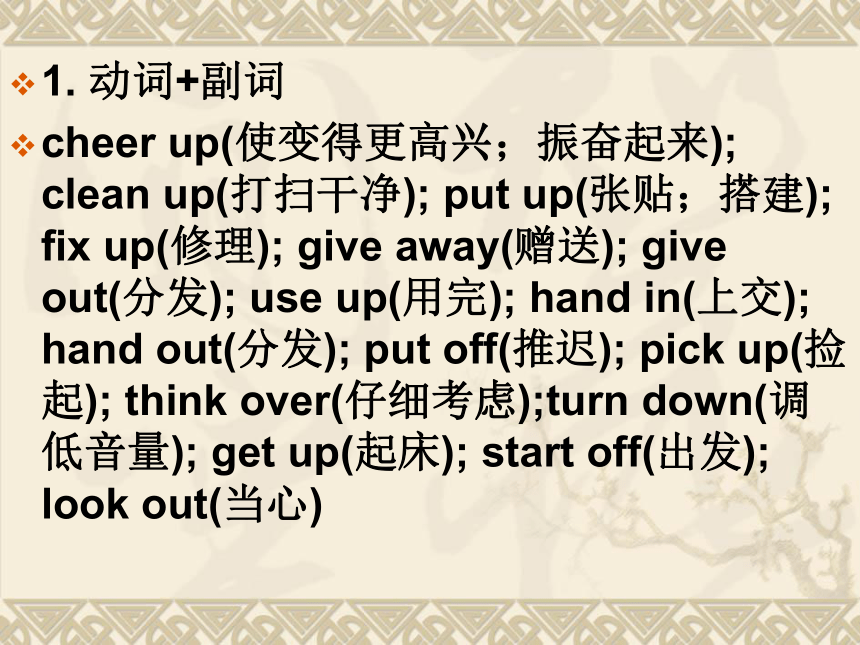
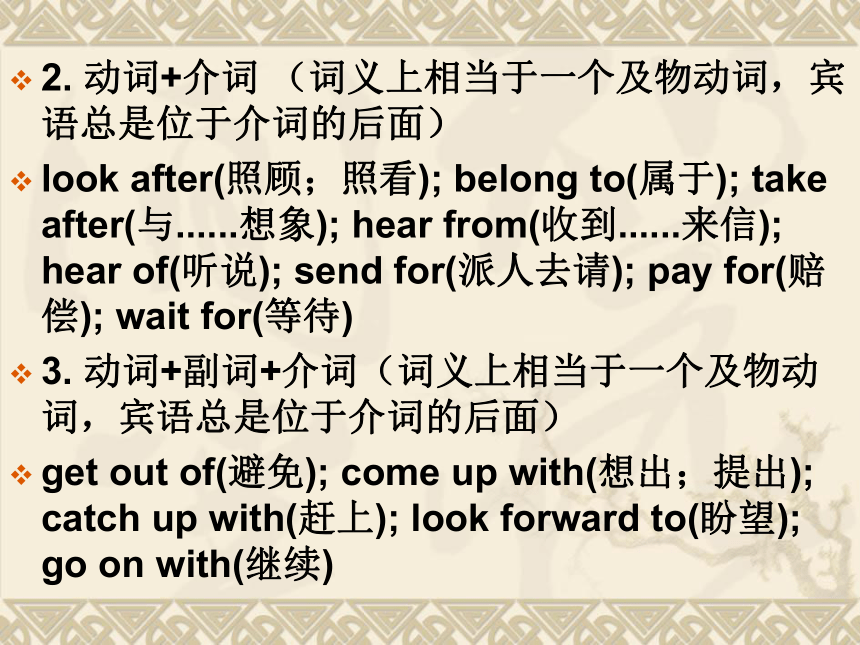
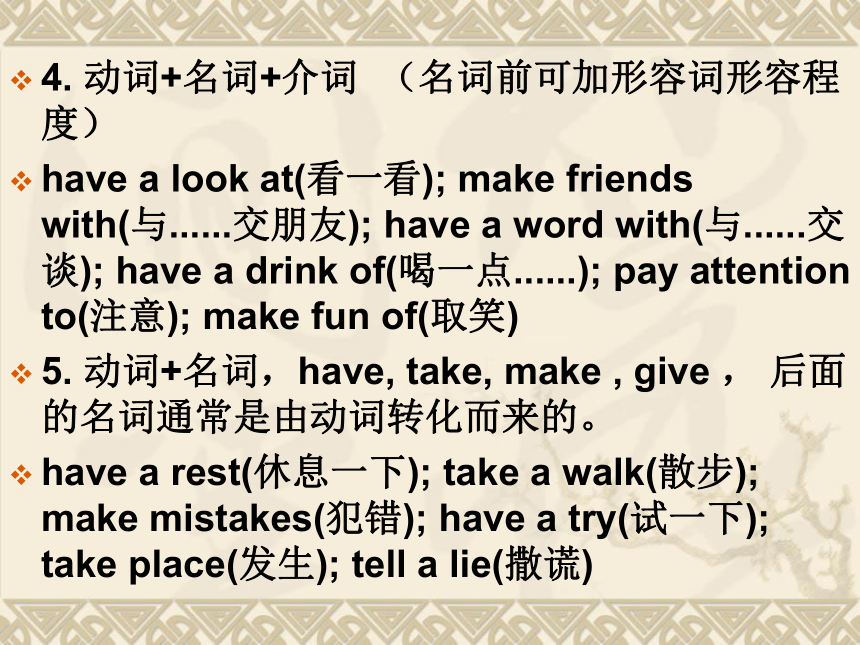

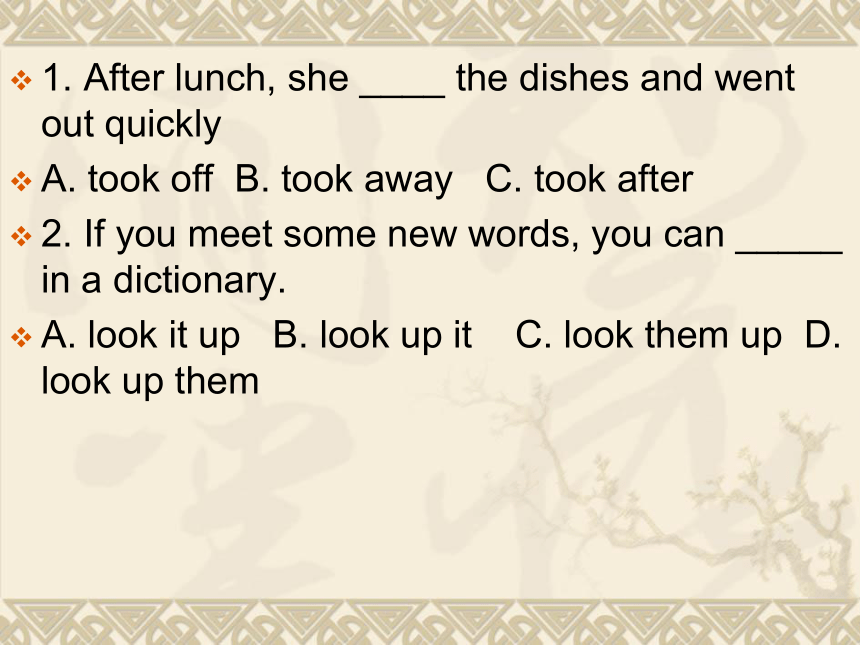
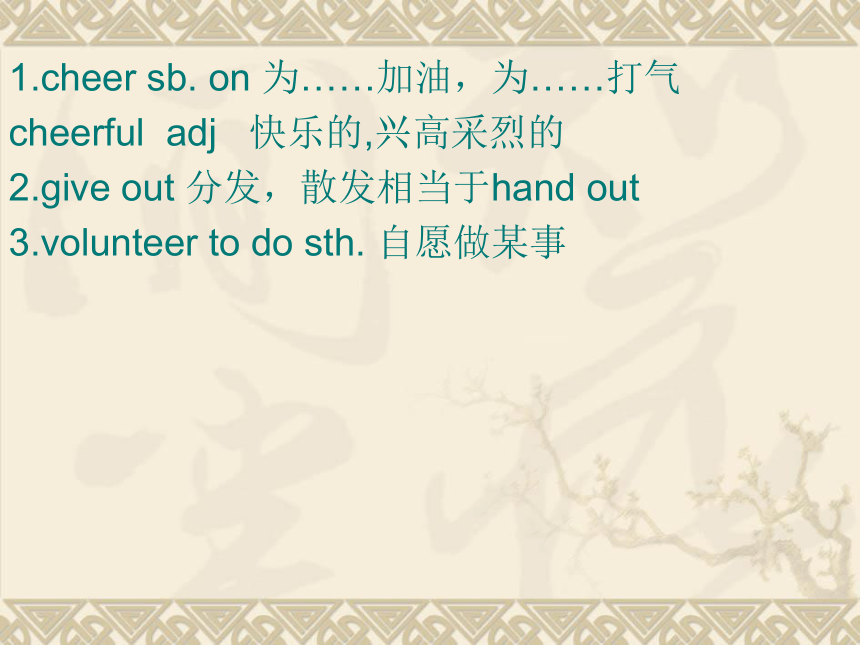
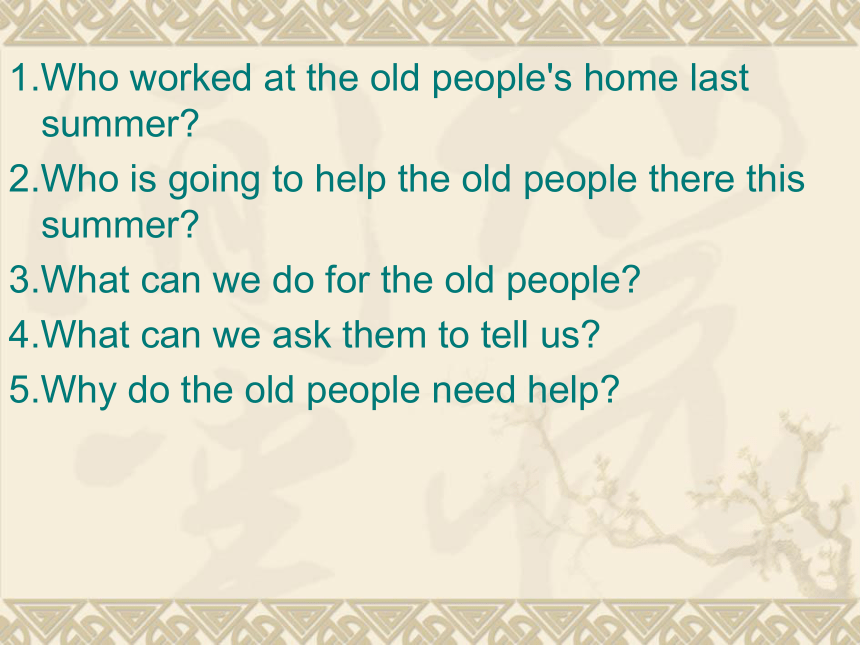
文档简介
课件21张PPT。Unit 2 Section A Joy Shi短语动词一种固定词组,由动词加介词或副词等构成,其作用相当于一个动词。
常见的形式有:
1. 动词+副词,如put up
2. 动词+介词,如look at
3. 动词+副词+介词,如run out of
4. 动词+名词+介词,如take care of
5. 动词+名词,have, take, make , give 等。
6. be+ 形容词(包括过去分词作形容词)+介词, 如be good at1. 动词+副词
cheer up(使变得更高兴;振奋起来); clean up(打扫干净); put up(张贴;搭建); fix up(修理); give away(赠送); give out(分发); use up(用完); hand in(上交); hand out(分发); put off(推迟); pick up(捡起); think over(仔细考虑);turn down(调低音量); get up(起床); start off(出发); look out(当心)2. 动词+介词 (词义上相当于一个及物动词,宾语总是位于介词的后面)
look after(照顾;照看); belong to(属于); take after(与......想象); hear from(收到......来信); hear of(听说); send for(派人去请); pay for(赔偿); wait for(等待)
3. 动词+副词+介词(词义上相当于一个及物动词,宾语总是位于介词的后面)
get out of(避免); come up with(想出;提出); catch up with(赶上); look forward to(盼望); go on with(继续)4. 动词+名词+介词 (名词前可加形容词形容程度)
have a look at(看一看); make friends with(与......交朋友); have a word with(与......交谈); have a drink of(喝一点......); pay attention to(注意); make fun of(取笑)
5. 动词+名词,have, take, make , give , 后面的名词通常是由动词转化而来的。
have a rest(休息一下); take a walk(散步); make mistakes(犯错); have a try(试一下); take place(发生); tell a lie(撒谎)6. be+ 形容词(包括过去词作形容词)+介词, 相当于及物动词,宾语位于介词的后面,形容词是短语动词的真正意义。
be late for(迟到); be angry with(生气); be fond of(喜爱); be good at(擅长); be good for(对......有益); be short of(缺乏); be similar to(与.....相似); be strict with(对......严格要求); be proud of(骄傲,自豪)1. After lunch, she ____ the dishes and went out quickly
A. took off B. took away C. took after
2. If you meet some new words, you can _____ in a dictionary.
A. look it up B. look up it C. look them up D. look up them1.cheer sb. on 为……加油,为……打气
cheerful adj 快乐的,兴高采烈的
2.give out 分发,散发相当于hand out
3.volunteer to do sth. 自愿做某事1.Who worked at the old people's home last summer?
2.Who is going to help the old people there this summer?
3.What can we do for the old people?
4.What can we ask them to tell us?
5.Why do the old people need help?used to 过去……,曾经……,后跟动词原形,表示”过去常常做某事”,只表示过去和现在的对比,暗指现在已经不存在的动作或状态。
He used to work in the hospital.
否定didn't use to或usedn’t to ,一般疑问句Did 或Used 提前。
He ______eating out all the time.
---My aunt goes to climb mountains every Sunday.
---Oh? But she _____ hate climbing mountains.lonely:孤独的,只能用作形容词,含有感彩
alone: 独自的,可用作形容词,多做表语和后置定语,也可用作副词,常放在动词后面做状语,相当于by oneself.
Though she is at home,
she does not feel for she has many things to do.1.Is the student in the 1st picture a boy or a girl?
2. Where is he?
3. What job do you think the man next to him in the picture does?
4. Where are the girls in the 2nd picture? Are they in the classroom or in the library? Why?
5. What are they doing?with joy: 高兴地
to one’s joy: 令某人高兴的是
不定式前加疑问词what, which, where, when, how等,主要用在know, tell, ask, learn 等动词之后做宾语,当宾语从句的主语与主句的主语相同时
也可转化为疑问词引导的宾语从句。
I don’t know what to do next= I don’t know what I should/ can do next.
He doesn’t know when he should go there(同义句)
He doesn’t know ___ ____ go there.
such a strong feeling of satisfaction.
feeling [C] 感觉;感触
I didn’t mean to hurt your feeling.
a (strong/bad/…) feeling of + 名词: 一种(强烈的、坏的/……)……感
a feeling of satisfaction
a feeling of excitement
a feeling of warmth.such: adj 修饰n
so: adv 修饰adj ,adv
such a strong feeling
so ____ ____ ____
但是当名词前有many, much, few, little 等修饰时,要用so 而不用such.
such/so …that… 如此……以至于……
satisfaction: 满足;满意
v satisfy: 使(某人)满足,满意
adj satisfied:满意的;满足的
satisfying:令人满意的
常见搭配:
with satisfaction: 满足地;满意地
to one’s satisfaction: 令某人满意的是/满足的是
a feeling of satisfactionowner: 物主,主人
The owner of … …… 的主人
He is the owner of the room.
v own: 拥有
He owns this room.
own: adj & pron.
……of one’s own= one’s own……属于某人自己的
on one’s own= by oneself 独自
1) 我想拥有一个属于我自己的房间
I’d love to have my own room.
I’d love to have ___ ____ ____ ____ _____ .
2) 我独自完成了它。
I finished it by myself.
I finished it ____ ____ _____.
journey: 多只有目的地的长途旅行。
trip: 一般指时间短,距离近的旅行或远足。
travel:泛指到各地的旅行,表示旅行的路途远,时间长。
tour:指途中在许多地方作短暂停留的观光旅览。还表示“巡回演出”。
I took a ______from Beijing to Shanghai last year.
We had a school _____ last weekend.
They will _____ around the world next year.
He went on a speaking _____ in the USA.raise: 筹集;征集
They want to raise enough money for building a school.
常见的形式有:
1. 动词+副词,如put up
2. 动词+介词,如look at
3. 动词+副词+介词,如run out of
4. 动词+名词+介词,如take care of
5. 动词+名词,have, take, make , give 等。
6. be+ 形容词(包括过去分词作形容词)+介词, 如be good at1. 动词+副词
cheer up(使变得更高兴;振奋起来); clean up(打扫干净); put up(张贴;搭建); fix up(修理); give away(赠送); give out(分发); use up(用完); hand in(上交); hand out(分发); put off(推迟); pick up(捡起); think over(仔细考虑);turn down(调低音量); get up(起床); start off(出发); look out(当心)2. 动词+介词 (词义上相当于一个及物动词,宾语总是位于介词的后面)
look after(照顾;照看); belong to(属于); take after(与......想象); hear from(收到......来信); hear of(听说); send for(派人去请); pay for(赔偿); wait for(等待)
3. 动词+副词+介词(词义上相当于一个及物动词,宾语总是位于介词的后面)
get out of(避免); come up with(想出;提出); catch up with(赶上); look forward to(盼望); go on with(继续)4. 动词+名词+介词 (名词前可加形容词形容程度)
have a look at(看一看); make friends with(与......交朋友); have a word with(与......交谈); have a drink of(喝一点......); pay attention to(注意); make fun of(取笑)
5. 动词+名词,have, take, make , give , 后面的名词通常是由动词转化而来的。
have a rest(休息一下); take a walk(散步); make mistakes(犯错); have a try(试一下); take place(发生); tell a lie(撒谎)6. be+ 形容词(包括过去词作形容词)+介词, 相当于及物动词,宾语位于介词的后面,形容词是短语动词的真正意义。
be late for(迟到); be angry with(生气); be fond of(喜爱); be good at(擅长); be good for(对......有益); be short of(缺乏); be similar to(与.....相似); be strict with(对......严格要求); be proud of(骄傲,自豪)1. After lunch, she ____ the dishes and went out quickly
A. took off B. took away C. took after
2. If you meet some new words, you can _____ in a dictionary.
A. look it up B. look up it C. look them up D. look up them1.cheer sb. on 为……加油,为……打气
cheerful adj 快乐的,兴高采烈的
2.give out 分发,散发相当于hand out
3.volunteer to do sth. 自愿做某事1.Who worked at the old people's home last summer?
2.Who is going to help the old people there this summer?
3.What can we do for the old people?
4.What can we ask them to tell us?
5.Why do the old people need help?used to 过去……,曾经……,后跟动词原形,表示”过去常常做某事”,只表示过去和现在的对比,暗指现在已经不存在的动作或状态。
He used to work in the hospital.
否定didn't use to或usedn’t to ,一般疑问句Did 或Used 提前。
He ______eating out all the time.
---My aunt goes to climb mountains every Sunday.
---Oh? But she _____ hate climbing mountains.lonely:孤独的,只能用作形容词,含有感彩
alone: 独自的,可用作形容词,多做表语和后置定语,也可用作副词,常放在动词后面做状语,相当于by oneself.
Though she is at home,
she does not feel for she has many things to do.1.Is the student in the 1st picture a boy or a girl?
2. Where is he?
3. What job do you think the man next to him in the picture does?
4. Where are the girls in the 2nd picture? Are they in the classroom or in the library? Why?
5. What are they doing?with joy: 高兴地
to one’s joy: 令某人高兴的是
不定式前加疑问词what, which, where, when, how等,主要用在know, tell, ask, learn 等动词之后做宾语,当宾语从句的主语与主句的主语相同时
也可转化为疑问词引导的宾语从句。
I don’t know what to do next= I don’t know what I should/ can do next.
He doesn’t know when he should go there(同义句)
He doesn’t know ___ ____ go there.
such a strong feeling of satisfaction.
feeling [C] 感觉;感触
I didn’t mean to hurt your feeling.
a (strong/bad/…) feeling of + 名词: 一种(强烈的、坏的/……)……感
a feeling of satisfaction
a feeling of excitement
a feeling of warmth.such: adj 修饰n
so: adv 修饰adj ,adv
such a strong feeling
so ____ ____ ____
但是当名词前有many, much, few, little 等修饰时,要用so 而不用such.
such/so …that… 如此……以至于……
satisfaction: 满足;满意
v satisfy: 使(某人)满足,满意
adj satisfied:满意的;满足的
satisfying:令人满意的
常见搭配:
with satisfaction: 满足地;满意地
to one’s satisfaction: 令某人满意的是/满足的是
a feeling of satisfactionowner: 物主,主人
The owner of … …… 的主人
He is the owner of the room.
v own: 拥有
He owns this room.
own: adj & pron.
……of one’s own= one’s own……属于某人自己的
on one’s own= by oneself 独自
1) 我想拥有一个属于我自己的房间
I’d love to have my own room.
I’d love to have ___ ____ ____ ____ _____ .
2) 我独自完成了它。
I finished it by myself.
I finished it ____ ____ _____.
journey: 多只有目的地的长途旅行。
trip: 一般指时间短,距离近的旅行或远足。
travel:泛指到各地的旅行,表示旅行的路途远,时间长。
tour:指途中在许多地方作短暂停留的观光旅览。还表示“巡回演出”。
I took a ______from Beijing to Shanghai last year.
We had a school _____ last weekend.
They will _____ around the world next year.
He went on a speaking _____ in the USA.raise: 筹集;征集
They want to raise enough money for building a school.
同课章节目录
- Unit 1 What's the matter?
- Section A
- Section B
- Unit 2 I'll help to clean up the city parks.
- Section A
- Section B
- Unit 3 Could you please clean your room?
- Section A
- Section B
- Unit 4 Why don't you talk to your parents?
- Section A
- Section B
- Unit 5 What were you doing when the rainstorm came
- Section A
- Section B
- Review of Units 1-5
- Unit 6 An old man tried to move the mountains.
- Section A
- Section B
- Unit 7 What's the highest mountain in the world?
- Section A
- Section B
- Unit 8 Have you read Treasure Island yet?
- Section A
- Section B
- Unit 9 Have you ever been to a museum?
- Section A
- Section B
- Unit 10 I've had this bike for three years.
- Section A
- Section B
